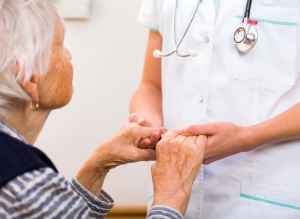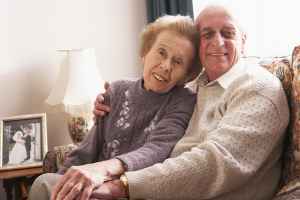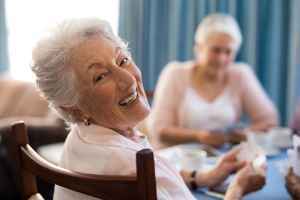Nursing Homes in Maryland
Maryland has a lot to offer retirees, whether they choose to settle on Chesapeake Bay, near the mountains of Western Maryland or close to the bustle in the Capital Region. There’s a high proportion of seniors, with almost 16% of the state’s 6 million residents aged 65 and over. These older adults enjoy a pleasant climate throughout the year and low sales taxes that help stretch the budget. Although the overall cost of living can be high, the cost of health care is around 10% lower than the national average. Couple this with some of the country’s best health care, such as Johns Hopkins Hospital, and Maryland becomes a great destination for health-conscious seniors. Five communities are members of AARP’s Network of Age-Friendly States and Communities, including Baltimore, Howard and Montgomery counties, and are committed to increasing services for older adults.
There are about 230 skilled nursing facilities around the state that offer care for people with complex medical needs. This guide provides information about the cost of long-term care, the rules and regulations that govern nursing homes in the state and the financial and other programs that can help seniors in long-term care.
SeniorAdvice's Guide to Nursing Home Care in Maryland
Maryland has a SeniorScore of 75, which is three points higher than the national average. The SeniorScore is calculated based on over 100 variables and aims to accurately show how comfortable an area is for seniors. In addition to the overall SeniorScore, SeniorAdvice gives more detailed information on four categories: Health & Safety, Recreation & Leisure, Finances and General Quality of Life.
The state’s highest-scoring category is Health & Safety, with a score of 68. This score is heavily influenced by the high number of hospitals, senior living facilities and Medicare-registered health care providers in Maryland. The Finances category scores slightly lower as the benefits of low sales and property taxes are impacted by the high cost of living and nursing home care.
The number of seniors in the state is on par with the number nationally, which impacts Maryland’s Recreation & Leisure score. The state’s 173 golf courses and 2,988 churches also contribute to the category’s score of 65. General Quality of Life is also scored at 65, with the comfortable climate and high population density influencing this score.
Top Nursing Care in Maryland
Hebrew Home of Greater Washington is located at 6121 Montrose Rd in Rockville, Maryland. It is a 558 bed senior care facility. The encompassing area is densely populated, with about 41,000 individuals residing in the zip code of ...
FutureCare Irvington is a 200 unit senior community. It is located within the Tremont neighborhood of Baltimore, Maryland. The community is in a mostly middle income area, with an average household income of $41,621. With around 46,000 ...
Located at 9701 Veirs Dr in Rockville, Maryland, The Village at Rockville is a 150 bed senior care community. The surrounding area has a dense population, with roughly 47,000 individuals living in the zip code of 20850. With ...
Northwest Hospital Subacute Unit is a 39 bed nursing home facility situated within the Milford Mill area of Randallstown, Maryland. The encompassing area has a dense population, with roughly 31,000 residents in the zip code of 21133. It ...
Located around the Redland area of Gaithersburg, Maryland, Wilson Health Care Center is a 288 unit nursing care facility. The neighboring area is densely populated, with roughly 35,000 individuals residing in the 20877 zip code. With a median ...
FutureCare Cherrywood is a 168 bed senior care facility. It is located at 12020 Reisterstown Rd in Reisterstown, Maryland. The community is in a largely upscale area, with an average per-family income of $82,649. With about 35,000 ...
Spa Creek Center is a 134 room senior community. It is located at 35 Milkshake Ln in Annapolis, Maryland. The encompassing area is heavily populated, with around 31,000 individuals residing in the zip code of 21403. With ...
Clinton Nursing and Rehabilitation Center is a 267 room skilled nursing facility. It is located at 9211 Stuart Ln in Clinton, Maryland. With roughly 36,000 individuals living in the zip code of 20735, the surrounding area has a ...
Heritage Harbour Health and Rehabilitation Center is a 154 bed nursing care facility situated close to the Londontowne neighborhood of Annapolis, Maryland. The community is in a primarily upper class area, with a median family income of $83,902. ...
Riderwood Village is a 117 unit senior care facility. It is situated in the Calverton neighborhood of Silver Spring, Maryland. With about 56,000 individuals living in the zip code of 20904, the neighboring area is heavily populated. ...
Situated near the Mays Chapel area of Lutherville, Maryland, Powerback Rehabilitation, Brightwood Campus is a 110 unit nursing facility. The encompassing area is densely populated, with around 37,000 individuals living in the 21093 zip code. With a median ...
Located at 5550 Tuckerman Ln in Bethesda, Maryland, Brighton Garden Tuckerman Lane is a 41 room senior housing facility. With approximately 41,000 individuals residing in the zip code of 20852, the neighboring area has a dense population. It ...
Situated near the Woodridge area of Riverdale, Maryland, Crescent Cities Center is a 140 unit senior housing facility. The surrounding area is densely populated, with approximately 22,000 poeple living in the 20737 zip code. With an average family ...
Fort Washington Health Center is a 150 unit skilled nursing facility situated around the Friendly neighborhood of Fort Washington, Maryland. With an average family income of $90,530, the facility is in a largely well-to-do area. It has a ...
Glen Burnie Health and Rehabilitation Center is a 190 unit skilled nursing facility situated near the Ferndale neighborhood of Glen Burnie, Maryland. The community is in a mostly middle class area, with a median per-family income of $59,495. ...
Located within the Wheaton-Glenmont area of Wheaton, Maryland, ManorCare Health Services - Wheaton is a 94 room skilled nursing facility. The neighboring area is heavily populated, with about 50,000 people residing in the zip code of 20902. With ...
Located at 9701 Medical Center Dr in Rockville, Maryland, Shady Grove Center is a 134 room senior housing community. The facility is in a largely upper class area, with an average family income of $105,204. With about 47,000 ...
ManorCare Health Services - Bethesda is a 110 unit nursing facility situated in Bethesda, Maryland. With an average per-family income of $166,977, the facility is in a primarily well-to-do area. It is heavily populated, with approximately 37,000 individuals ...
ManorCare Health Services - Chevy Chase is located within the Hawthorne area of Chevy Chase, Maryland. It is a 172 bed skilled nursing facility. The facility is in a largely affluent area, with a median household income of ...
Calvert Memorial Hospital Transitional Care Unit is a 16 bed nursing facility. It is located at 100 Hospital Rd in Prince Frederick, Maryland. The encompassing area has an average population density, with around 12,000 poeple living in the ...
The Cost of Nursing Home Care in Maryland
Seniors in Maryland pay an average of $10,190 per month for nursing home care, according to the Genworth 2020 Cost of Care Survey. This is $2,434 higher than the national average of $7,756 but is on par with nearby states. Virginia is the only one of Maryland’s neighbors that has an average cost lower than the national average, at $7,665, while seniors in Pennsylvania pay slightly less than those in Maryland, at $10,038 per month. The cost rises by more than $2,000 per month in Delaware and Washington, D.C., with seniors paying $12,349 and $12,471, respectively.
- Maryland: $10,190
- United States: $7,756
- Virginia: $7,665
- Pennsylvania: $10,038
- Delaware: $12,349
- District of Columbia: $12,471
The Cost of Nursing Home Care in Maryland’s Top Cities
Nursing home care in some of Maryland’s cities is significantly lower than the state average. The lowest prices of $8,137 and $8,213 are found in California and Cumberland, respectively. At $9,794, seniors in Hagerstown also pay less than the Maryland median. In Salisbury, the average is $10,768, while seniors in Baltimore pay $11,984 per month.
- Cumberland: $8,213
- Hagerstown: $9,794
- Baltimore: $11,984
- Salisbury: $10,768
- California: $8,137
Senior Care Cost Comparison in Maryland
The cost of nursing home care in Maryland is higher than the cost of other types of senior care. Skilled nursing in the state costs $3,940 more than memory care, which averages $6,250 per month and $5,190 more than assisted living. Seniors receiving in-home care or home health care pay $4,576 and $4,767, respectively. Adult day care is also available in many locations in Maryland and costs just $1,842 per month.
- Memory Care: $6,250
- Assisted Living: $5,000
- In-Home Care: $4,576
- Home Health Care: $4,767
- Adult Day Care: $1,842
- Nursing Home Care: $10,190
Financial Assistance for Nursing Home Care in Maryland
As you can see above, Nursing Home Care is often the most expensive senior care option – sometimes even 2-3 times the cost of other types of senior living. The primary reason for this is the 24/7 skilled nursing and other medical services that are provided. Thankfully, most people aren't forced to pay for skilled nursing care entirely out-of-pocket. Rather, many qualify for financial assistance programs to help cover the cost of nursing care.
Medicaid is the most comprehensive financial assistance program – but, not all seniors are eligible for Medicaid. And because each state operates its own Medicaid program within federal guidelines, eligibility and benefits vary from state to state. Below, we provide more information on Medicaid in Maryland.
Medicaid in Maryland
Medicaid in Maryland provides health insurance to low-income adults and children and is funded by both state and federal governments. In addition to primary and acute medical care, Medicaid covers many long-term services and supports, including skilled nursing care. Maryland expanded its Medicaid coverage in 2013 and since then has increased enrollment by more than 67%. There are now over 1.4 million people enrolled in Medicaid or CHIP in the state, and Medicaid helps over 20,000 people each year who are in nursing facilities. The majority of the state’s estimated 230 skilled nursing facilities offer beds to Medicaid participants.
Medicaid Eligibility in Maryland
Medicaid in Maryland is also known as Medical Assistance, or MA. Seniors and disabled adults must meet a number of eligibility criteria to qualify for long-term care assistance. Firstly, an applicant’s income must not exceed the income limit. Maryland doesn’t have a strict income limit for people entering a nursing home, but their income must not exceed the cost of nursing home care. The recipient’s income all goes toward their nursing home care, minus a personal needs allowance of $83 per month. Other basic requirements include:
- Single applicants can have assets of up to $2,500, while married couples who are both applying can have up to $6,000 of assets, or $3,000 each. Personal property, including a home or vehicle, isn't counted.
- Non-applicant spouses may be eligible for a Minimum Monthly Maintenance Needs Allowance and can retain up to $130,380 worth of assets.
- Applicants must be residents of Maryland and either U.S. citizens or noncitizens who meet immigrant status requirements, which includes a lawful permanent resident or refugee.
- People entering a nursing home must also be assessed as requiring a nursing home level of care.
The best way to determine eligibility for Medicaid is to apply to the Maryland Department of Health. There are options to apply in person or by mail. Applicants in Baltimore City or Baltimore, Anne Arundel or Prince George’s counties can apply to the Bureau of Long-Term Care, while people in all other counties can contact their Local Department of Social Services. Seniors can also apply online through MDThink.
Additional Financial Assistance Options
- Medicare: For the first 20 days in a skilled nursing facility, Medicare will cover the entire cost of care, and a portion of the costs up until day 100. After 100 days, Medicare won't cover any of the costs. Importantly, seniors must also have a "qualifying hospital stay" that lasts 3 days prior to their admission to a nursing home in order to qualify for Medicare coverage.
- Aid and Attendance: Aid and Attendance may be available to veterans who receive a VA pension. This benefit is a monthly cash allowance that veterans receive in addition to their standard pension amount. It is intended for veterans in need of long-term care services and may be used to pay for skilled nursing care.
- Reverse Mortgages: For those who own a home, reverse mortgages are loans that one can take out against the value of their home, essentially converting some of the home's equity into cash. It's often a good fit for married couples when only one partner needs nursing care, as the other residents of the home may continue living there. Keep in mind that reverse mortgage loans do need to be repaid (with interest), typically within 12 months of receiving the loan.
- Long-Term Care Insurance: For seniors who already have long-term care insurance, the cost of skilled nursing care may be covered. Most policies cover at least a portion of the costs, but it depends on the specific policy terms. It's important to note that older adults who are already in need of skilled nursing care will not be eligible to sign up for a long-term care insurance policy.
Maryland Nursing Home Care Rules and Regulations
The Office of Health Care Quality licenses and certifies health care facilities within the state. The Long-Term Care Unit is responsible for ensuring nursing homes, also known as comprehensive care facilities, meet state licensure and Medicaid/Medicare standards by conducting on-site surveys and investigating complaints. Below are some of the regulations that Maryland nursing homes must follow.
Scope of Care | Nursing homes provide non-acute inpatient care to residents who need a high level of nursing care but not continuous hospital care. This care is provided 24 hours a day, and each resident must receive at least three hours of bedside care daily. New residents must not be admitted if the attending physician believes they are a danger to themselves or others or if the facility cannot provide the care needed. Nursing homes may also have Special Care Units that provide specialized services such as respiratory or dementia care. |
Care Planning | A physician must assess each resident within 30 days of admission. Within seven days of this assessment, an interdisciplinary team must develop a care plan to determine the appropriate services and programs. The resident’s family or representative should be invited to this meeting, and every effort should be made to schedule the meeting when they can attend. Residents should receive quarterly and annual assessments, as well as an assessment if their needs change significantly. A new care plan should be developed within seven days of these assessments. |
Pharmacy Services | Any medication provided to a resident must be ordered in writing by the resident’s physician. Appropriately licensed personnel or people who have graduated from a state-approved medicine aide course can administer medications. Facilities must arrange for pharmacies to provide medications, although they must also have provisions for residents to choose their own pharmacist. Nursing homes must have a pharmacist on staff or be in a contract with one. This pharmacist oversees the administration of pharmacy services in the facility and must visit often enough to ensure policies and regulations are being followed. |
Staff Screening | All staff working in direct contact with residents must complete a Criminal History Records Check, which includes a fingerprint check. This is also a requirement of licensure for nurses and nursing aides, and the Maryland Board of Nursing maintains a registry of licensed professionals. |
Staff Training | Anyone providing health care to residents must be appropriately licensed. Unlicensed personnel who provide care to residents must complete Geriatric Nursing Assistant Training, which consists of at least 75 hours of instruction, including 37.5 hours of supervised clinical experience. All people employed by the nursing home must have training in cognitive and mental impairment. In addition, nursing homes must organize an ongoing training program for staff that covers a range of topics, including infection and accident prevention, patient confidentiality and the needs of aged individuals. |
Medicaid Coverage | Maryland Medicaid covers nursing facility care for seniors and disabled adults who meet the financial eligibility requirements. Applicants must also be assessed as requiring a nursing home level of care. |
Reporting Abuse | Suspected abuse or neglect should be reported to the Office of Health Care Quality at (877) 402-8219. Instances of financial exploitation can be reported to the local Adult Protective Services office or the statewide abuse number at (800) 332-6347. Staff of nursing homes must report any instance where they’re asked to provide medical care that they consider questionable. |
Free Nursing Home Resources in Maryland
Senior Legal Assistance Program
The Senior Legal Assistance Program provides legal advice, counseling and representation to older adults in the state. The program is available to people aged 60 and over and their caregivers. In addition, Senior Legal Assistance helps local ombudsmen, health insurance counselors and legal guardians. Assistance can be provided for a range of issues, including income maintenance, advocacy for people in institutions, health care and protective services.
There's no cost for assistance with priority issues. Seniors can access the service through their local Area Agency on Aging.
Health Facilities Association of Maryland
The Health Facilities Association of Maryland is a trade association that represents long-term care providers in the state, including assisted living, rehabilitation and skilled nursing facilities. Its main work is advocating for its members and creating a dialogue with state, county and local government agencies. In addition, HFAM provides guidance, resources and support to help the public make informed decisions about their long-term care options. This includes support to residents of long-term care facilities and information about fees, patient rights and policies.
Maryland Agencies
Maryland Department of Health
Address: 201 W. Preston Street, Baltimore, MD 21201-2399
Phone Number: (410) 767-6500
Website: health.maryland.gov/pages/home.aspx
The Maryland Department of Health administers a range of programs that support the health of residents across the state. The Office of Health Quality, Long-Term Care Unit of the Department of Health inspects long-term care facilities and investigates complaints, ensuring compliance with state and federal regulations. In addition, the Department administers Medicaid and has other programs that help people with the cost of health care, including the cost of prescription medications.
Senior Health Insurance Program
Address: Not available
Phone Number: Contact the local office
Website: mhcc.maryland.gov/consumerinfo/longtermcare/SeniorHealthInsuranceProgram.aspx
The Senior Health Insurance Program helps Medicare beneficiaries of any age understand their health insurance. Local counselors available in Maryland’s 24 counties can help beneficiaries with queries about billing, benefits and their rights. Counselors can also help people apply for benefits, assist with grievances and complaints and give advice on health care fraud and abuse. In-person and telephone assistance is available, and all services are confidential and free of charge.
Area Agencies on Aging in Maryland
The terms Area Agencies on Aging and Maryland Access Points are sometimes used interchangeably in the state. MAP is a partnership between AAAs and local Centers for Independent Living. These sites provide individual counseling to people seeking information and support for long-term care. In addition, Maryland residents can access planning assistance, caregiver support and a range of community services, including elder abuse prevention and legal assistance. There are 20 MAP sites around the state that seniors can contact to access AAA services.
Veteran Affairs Office in Maryland
The Maryland Department of Veterans Affairs helps veterans and their families secure benefits and services from the different programs set up to help people who have served in the U.S. military. Service Officers work at sites throughout the state to identify benefits that people are entitled to and assist in preparing, submitting and tracking claims. The MDVA also operates the Charlotte Hall Veterans Home, which provides assisted living, memory care and skilled nursing to eligible veterans. Veterans can contact their local office to access support.
Social Security Offices in Maryland
A number of programs administered by the Social Security Administration are designed to assist older and disabled adults in Maryland. The SSA manages disability and retirement benefits, Medicare enrollment and survivor’s payments. Seniors who receive the Supplementary Security Income are automatically eligible for Medicaid in Maryland. The Optional State Supplementation payment can also help eligible seniors pay for care. Seniors can contact their local Social Security office for help accessing benefits.






















 Your Information is Processing
Your Information is Processing